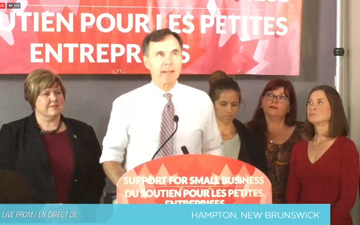Finance Minister Morneau announces changes to passive investment rules

Latest round of tax changes unlikely to impress or affect most Canadians
TORONTO, Oct. 18, 2017 – In a move unlikely to affect or impress most business owners and tax planners, embattled Finance Minister Bill Morneau announced changes today to passive investment rules at a press conference in Hampton, New Brunswick. Morneau, flanked by female entrepreneurs, announced a “threshold” of passive investment income of $50,000 per year for business owners.
According to the Minister, this is equivalent to $1 million in savings. For about 97 per cent of private corporations, there will be no tax increase on passive investment income. Morneau said that, for those businesses that exceed the threshold, passive investment income will be taxed at personal taxation rates, “taxed in line with someone who takes home a paycheque every couple of weeks.”
There will be no penalties on capital already invested by business owners. “Existing savings — and any income from those savings — will not be affected,” said Morneau. “We didn’t design the system that we inherited but we are absolutely committed to fixing it that doesn’t create advantages only for the few.”
According to the Minister, 85 per cent of Canadian small businesses have no passive investment income at all. Two to three per cent, about 29,000 out of the 1.8 million private corporations in Canada, hold 80 per cent of the assets.
“What we are trying to make sure we do is balance the need of people to invest in their businesses, with the goal of making sure they create advantages,” said the Minister. “This not an opportunity for the most wealthy to use this vehicle purely as a tax planning strategy.”
There were no questions asked of Morneau regarding the current controversy over his personal financial holdings. The Minister has been hounded by critics who have questioned his integrity in managing his substantial personal fortune, either selling his shares of pension management firm Morneau Shepell or placing his stake in a blind trust.
In a letter to the Minister, Ethics Commissioner Mary Dawson stated, “Considering that you do not hold controlled assets as contemplated under section 17 of the [Conflict of Interest Act], a blind trust agreement is therefore not required under section 27 of the Act.” Dawson has explained that statement, explaining that the rules apply only controlled assets held directly.
That is unlikely to appease critics, who note the Minister’s use of numbered companies, as well as a higher standard of ethics expected from the chief financial officer of the country.
Today’s announcement is unlikely to affect most tax planners or impress advocates of higher taxes on wealthy individuals. Many Canadian accountants who specialize in tax were anticipating the imposition of a threshold of roughly $50,000.
One source told Canadian Accountant that they would simply advise their clients to come as close to the threshold as comfortable (say, $49,500), and they would find other ways to minimize their clients' taxes.
Colin Ellis editor-in-chief of Canadian Accountant.










(0) Comments